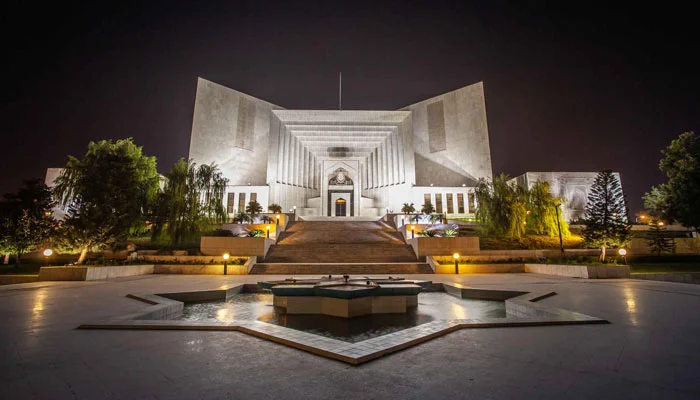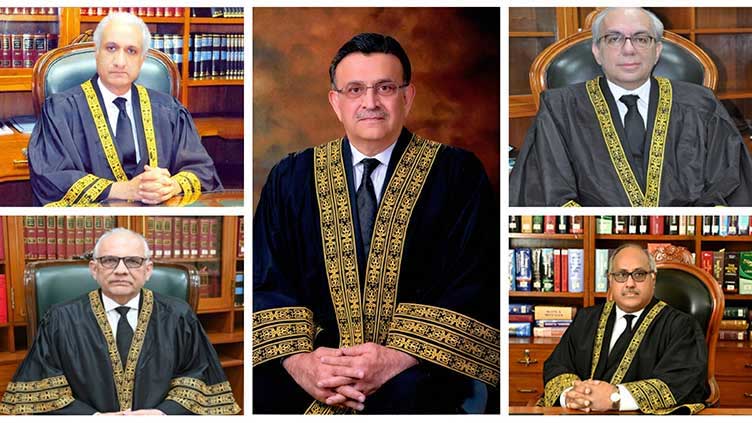
Apex Court rejects the previous PDM govt’s objections to bench hearing pleas against audio leaks commission
Order says objections were ‘an attack on the independence of the judiciary’
32-page long detailed judgment written by CJP Justice Umar Ata Bandial issued
ISLAMABAD ( Web News )
The Supreme Court of Pakistan on Friday rejected the previous Pakistan Democratic Movement (PDM) government’s objections to the bench hearing a set of pleas challenging the constitution of a three-judge commission set up to probe the veracity of audio leaks that had implicated politicians as well as judges of the top court and their family members.
Justice Ijazul Ahsan announced the short order in the open court on Friday, saying that the objections were “an attack on the independence of the judiciary”. Later in the day, 32-page long detailed judgment written by Chief Justice of Pakistan Justice Umar Ata Bandial was issued.
The previous coalition government had formed the commission on May 20 under Section 3 of the Pakistan Commission of Inquiry Act 2017. Led by senior puisne judge Justice Qazi Faez Isa, the commission also comprised Balochistan High Court Chief Justice Naeem Akhtar Afghan and Islamabad High Court Chief Justice Aamer Farooq.
On May 26, the top court had restrained the panel from going ahead with its task. The verdict was issued by the five-member bench hearing the case.
The order was passed on a set of petitions moved by Supreme Court Bar Association (SCBA) President Abid Shahid Zuberi, SCBA Secretary Muqtedir Akhtar Shabbir, PTI Chairman Imran Khan and Advocate Riaz Hanif Rahi seeking to declare the constitution of the audio commission illegal.
Subsequently, the government-appointed commission decided to put its proceedings on hold until the SC decided the petitions.
However, the PDM government sought the reconstitution of the five-member bench — led by Chief Justice of Pakistan Umar Ata Bandial and comprising Justice Ahsan, Justice Munib Akhtar, Justice Syed Hasan Azhar Rizvi and Justice Shahid Waheed — hearing the pleas against the formation of the commission.
In its application, the PDM government had asked CJP Bandial, Justice Ahsan, and Justice Akhtar to distance themselves from the bench since “rules of natural justice” demanded that the “adjudicator should be impartial”.
In addition to the objection raised about the presence of the CJP on the bench, the application had also pointed out that some of the audio leaks also concerned two other members, Justice Akhtar and Justice Ahsan.
One audio leak pertained to a conversation between petitioner Abid Zuberi and the then chief minister, discussing a case of CCPO Ghulam Mehmood Dogar. The bench hearing the case was headed by Justice Ahsan.
Similarly, another audio leak was about a conversation between a senior lawyer’s wife and the mother-in-law of the CJP, wherein reference was made to Justice Akhtar.
A detailed verdict, authored by CJP Bandial, was issued later in the day.
The detailed verdict said that the court’s query about how the CJP or his relative’s interest were involved in the case was “neither answered nor explained” by the attorney general for Pakistan (AGP) Mansoor Usman Awan.
“He candidly admitted though that no pecuniary or propriety interest of either the CJP or his relative was tied with the fate of the said petitions. When asked to explain the term ‘conflict of interest’ the learned AGP merely clarified that as a ground of recusal it was distinct from ‘bias’. The latter being an allegation that the federal government had not raised.
“The diffidence of the learned AGP to respond to the court’s questions denotes that the objection of the federal government may have been raised nonchalantly possibly to delay a decision on the merit or to harass the concerned judge,” the order said.
The order said that conflict of interest and bias were indeed grounds on which a party could seek the recusal of a judge from hearing a case.
“Whilst conflict of interest is related to the judge’s interest in the subject matter of a particular case, bias is concerned with his state of mind and his feelings towards the parties appearing before him. Since the learned AGP confined his submissions to the ground of conflict of interest only and not on bias, it is clear that the federal government does not anticipate any prejudice from the CJP,” it said.
It said that the AGP’s failure to identify the specific cause, and the interest of the CJP or his relative rendered the previous government’s allegations against the top judge “fanciful”.
“Moreover, the relative of the CJP is neither a party in these petitions nor is she claimed to be involved in the controversy under adjudication before the court,” the order said.
Therefore, it appeared that the “illusionary claim of conflict of interest” against the CJP had been alleged, prima facie, to postpone a decision in the case.
“Such an object appears to be consonant with the federal government’s strategy […] of blocking or delaying the court’s decisions on questions of law requiring the interpretation of constitutional principles,” the judgement said.
The judgment also reflected on the previous government’s “inimical” treatment of the top court and some of its judges.
It said that there was a “chain of events” in which the previous government and its ministers had sought to “erode the authority” of the court and to “blemish the stature of some of its Judges with the object of blocking, delaying or distorting the result of the judgments of the court on the constitutional right of the people to be governed by an elected government”.
The order said that the PDM government, through “various machinations and stratagems, had managed to delay adjudication by the court and also discredited its judgments.
It cited the Supreme Court (Review of Judgments and Orders) Act, 2023 enacted by Parliament — which has since been struck down by the court — seeking repeated recusals of certain judges and “incendiary” remarks made by former ministers as examples.
It also said that the then-government “took refuge” behind the election watchdog’s appeal against the April 4 order of holding elections to the Punjab Assembly.
“The court has faced all such actions of the federal government with tolerance, forbearance and restraint. However, it goes without saying that any refusal to implement a final and therefore binding judgment of the court can be visited with consequences laid down in the Constitution,” it said.
The order said that the application filed by the federal government was declared to be “devoid of merit and legal force”.
“To our minds the recusal application suffers from the common defect of being motivated and hence constitutes an attack on the independence of the judiciary. In view of the foregoing, the recusal application is dismissed,” the order said.
In the written order, the SC stated that the Attorney General for Pakistan (AGP) Mansoor Awan had raised objections over the presence of three judges included in the bench citing “conflict of interest”.
During the hearing, Awan said the three judges should separate from the bench, while the petitioner’s lawyer gave counterarguments.
After hearing the arguments of both parties, the court reserved its verdict, stating that the order of May 26 would stand till the objections raised on the formation of the bench were decided.
The hearing of the case was adjourned for an indefinite period.
The order maintained that it was an accepted and settled constitutional principle, acted upon several times in the constitution of commissions, that whenever a sitting judge was intended to be made a member of the body, the permission of the CJP had to be sought first.
The order further noted that as the federal government appeared to have acted unilaterally in this matter, a “constitutional principle” of the highest importance had been, prima facie, “breached”.
It is worth mentioning here that the plea by the PDM government had stated that having Justice Bandial on the bench hearing the matter that seeks to challenge the inquiry commission on audio leaks pertaining to a very close family member of CJP “contributes to and raises grave concerns vis-a-vis appearance of impartiality”.
“These objections pertain only to the appearance of impartiality and conflict of interest and therefore are distinct and separate to bias which has neither been raised nor is the contention of the applicant,” the petition had said, adding the conflict of interest also does not pertain to pecuniary or proprietary interests.
“Propriety and good sense dictate and demand that Justice Ahsan and Justice Akhtar may also graciously recuse themselves from hearing the captioned petition,” the application had said.
The top court had reserved its verdict on the government’s plea on June 6. During the hearing, CJP Bandial had asked if the government, with all its resources, had ever taken any step to find out who was behind the audio leaks, particularly when such clips were being released through the Twitter handle of a hacker.
“From where and how are these audio leaks coming forward and who is behind all this,” the CJP had wondered.
At this, Attorney General for Pakistan (AGP) Mansoor Usman Awan had argued that to put all such issues at rest, the federal government had intentionally wanted that the three-judge commission undertake this exercise by probing all these aspects.
He had added the government’s plea for reconstitution of the five-member SC bench was not related to “bias” on part of any judge, but due to “conflict of interest”.
A high-powered judicial commission comprising Justice Qazi Faez Isa along with Justice Naeem Akhtar Afghan and Justice Aamer Farooq was tasked on May 20 to probe the audio leaks related to the judiciary. The commission was tasked to complete the inquiry within 30 days.
Among the multiple audio leaks, the commission will also probe into the veracity of the alleged call between former Punjab chief minister Chaudhry Parvez Elahi and a sitting top court judge as well as another call between CM Elahi and a Supreme Court lawyer over the constitution of an apex court bench.
Subsequently, Pakistan Tehreek-e-Insaf (PTI) Chairman Imran Khan questioned the government for the “deliberate omission” of the terms of reference (TORs) and challenged the formation of the three-member judicial commission on audio leaks.
Babar Awan, the PTI chief’s lawyer and party leader, had filed the plea on his behalf requesting the court to declare the notification for constituting the commission null and void.
Similarly, Zubairi had also challenged the audio leaks commission to summon directing him to appear before the panel in connection with the inquiry.
Law Minister Azam Nazeer Tarar earlier said that the government did not consult CJP Bandial before forming the commission.
In light of these petitions, the Supreme Court stayed the proceedings of the commission and suspended the federal government’s notification of the commission’s constitution.
The order was issued by a five-member SC bench headed by Chief Justice Umar Ata Bandial and comprising Justice Ijaz ul Ahsan, Justice Munib Akhtar, Justice Syed Hasan Azhar Rizvi and Justice Shahid Waheed.

